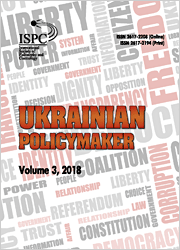Ukrainian Philosophical Thought at the Brink between East and West
Ukrainian Philosophical Thought at the Brink between East and West
Author(s): Pavlo SodomoraSubject(s): Politics / Political Sciences, Anthropology, Philosophy, Education, Sociology, Politics of History/Memory, Politics and Identity, Identity of Collectives
Published by: Международное философско-космологическое общество
Keywords: education; culture; memory; tradition; translation; being; existence;
Summary/Abstract: Ukrainian philosophical thought has been developing under the influence of several philosophical streams. Being influences by Orthodox tradition mainly, Church has always been at the forefront of any political campaign conducted on Ukrainian terrain. The level of education plays a key role in the process of cultural development of any country. Western part of Ukraine, comparing to its Eastern counterpart, had better access to education and information due to Catholic Church predominance in the region. Scholastic teaching was accepted by Ukrainian culture partially only, as well as it appeared to be interspersed with Patristics in an Orthodox vestition. The article intends to investigate the scholastic and patristic thought and its reproduction by Ukrainian cultural environment via various European teaching systems. Ukraine has been developing in a broad European context and this is why it could not have been deprived of influential teachings. However, Russian imperialistic and later communist ideology was hindering constantly the deployment and development of many ideas that were important for European philosophy. Together with Eastern theology, which was based mainly on works of Damascenus,Aristotelian traditions were introduced in Ukrainian schools gradually, and based on Aristotle’s works,theology of Saint Thomas was taught. Prominent Ukrainian thinkers, such as Petro Mohyla, KasianSakovych, Stanislav Orichovsky were influenced by many scholastic philosophers, including Saint Thomas Aquinas. Aquinas’ influence is apparent in later thinkers, such as Gabriel Kostelnyk and other prominent philosophers. In conclusion, it is apparent that despite the fact that so-called “philosophy of heart” was more intimate to the majority of Ukrainian thinkers; still Western approach was represented in various aspects and periods of development of Ukrainian philosophical thought.
Journal: Ukrainian Policymaker
- Issue Year: 3/2018
- Issue No: 3
- Page Range: 65-71
- Page Count: 6
- Language: English

